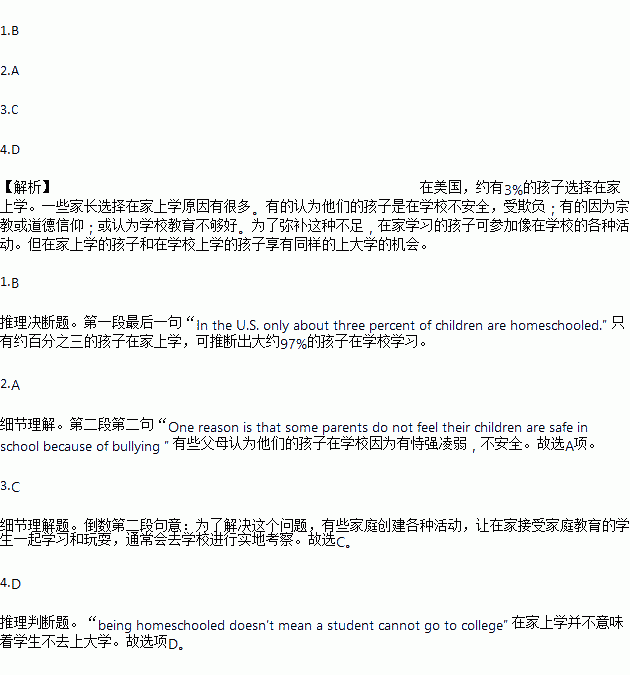题目内容
Not every parent looks forward to the day when their child goes off to school.In fact some parents are not sending their children to school at all.Instead they are choosing to teach their children at home.This is called homeschooling.Parents,caregivers,or private tutors educate children individually at home instead of sending them off to be formally educated in public or private schools.In the U.S. only about three percent of children are homeschooled.
There are many reasons why some parents choose to homeschool.One reason is that some parents do not feel their children are safe in school because of bullying(恃强凌弱).It is said that bullying is very common in the school. Other parents want their children's education to be based on their religion or moral beliefs.Yet other parents think the education in school is not good enough.Homeschooling is also seen as a choice for families that live in rural areas, and families that move frequently.
There are many different ways to homeschool,and homeschooling allows parents to design lessons based on their children's needs.Families can purchase textbooks to use or create their own materials.Some parents follow a philosophy called unschooling,which allows a child to determine when and how they want to learn based on their natural ability.Some worry that homeschooling means students won't have opportunities to communicate with others.
To solve this problem,some families have created activities,where a group of homeschooled students will learn and play together and participate in activities that would normally happen in school like field trips.
Besides,being homeschooled doesn't mean a student cannot go to college.Most colleges accept homeschooled students.And the homeschooled students can get the same degrees,too.
1.How many American students go to public or private schools?
A. About 3%. B. About 97%.
C. About 50%. D. About 70%.
2.Which is the reason that some parents choose homeschooling?
A. School bullying exists in some schools.
B. Some parents cannot afford the education fees in school.
C. Some children want their education to be based on their religion.
D. Some parents think the school is too far away.
3.What will the parents do to help their children communicate?
A. The parents can buy some textbooks.
B. The parents will allow children to choose what to learn.
C. The parents will organize the children to play together.
D. The parents will teach the children by themselves.
4.What can we conclude from the last paragraph?
A. Homeschooled students cannot get enough chances to go to college.
B. American colleges are fond of the homeschooled students.
C. Homeschooled students find it easy to go to some American colleges.
D. Homeschooled students have the same rights as students who are formally educated in schools.

